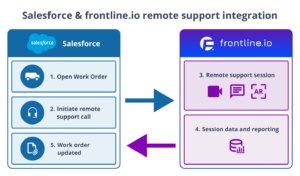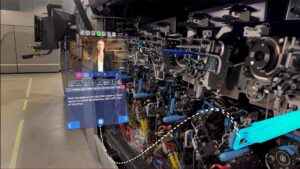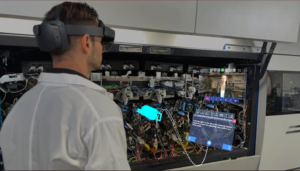VR Glasses For Industrial Use
In the industrial and manufacturing sector, extended reality (XR) offers endless possibilities for rapid product creation, prototyping, and training. It's safe to say that XR has something to offer every industry, but the manufacturing and industrial sectors have been early adopters.
For years, manufacturing and industrial brands have been searching for technology solutions to a wide range of issues, such as slow and expensive product development and complex training requirements. Product testing and approval are only the beginning of XR’s potential to revolutionize the manufacturing industry.

The use of virtual and augmented reality in product and service development could lead to a $360 billion GDP boost by 2030, according to PwC research.
What are VR glasses?
VR glasses for industrial use are a screen placed directly in front of the user’s eyes, eliminating all other visual cues. When one can see one’s own physical self in the virtual world as an avatar, it enhances the sense of immersion. The images projected by industrial VR glasses can also be adapted to the movements of the wearer’s body so that a simple change of direction causes a difference in the scene.
Microsoft HoloLens 2, RealWear HMT-1 and Vuzix M400 are three of the best VR glasses for industrial use. The latter devices are particularly suited to construction, production, oil, gas, and automotive industries due to their structural properties. The Microsoft HoloLens 2 is more sensitive and designed for indoor use in healthcare and product manufacturing.
VR and AR platforms such as frontline.io are compatible with any device to enable AR remote support and digital twinning technology.
VR and digital twinning
A digital twin is a virtual representation of the “state” of a complex physical device or system that exchanges data between the asset and its “twin.” The asset could be anything from a car to an aeroplane engine to a windmill turbine. As more complex devices connect and generate data, having a digital representation of an asset allows enterprises to optimize real-world deployments further and create “what if” testing scenarios for their solutions by enabling comparison.
VR glasses for industrial use can revolutionize manufacturing and production by designing entire products in a digital state before going into production.
Using VR is an excellent method for presenting the data generated by the digital twin’s simulations and the data fed into it by the sensors. In the past, presenting data in VR has been highly effective for other industries, such as the oil and gas and banking industries. VR can be used with digital twins in this manner. Workers on-site can be presented with data from digital twinning by using VR glasses for industrial use and 3D digital representations of large sites such as an oil rig or an energy plant. Instead of working with raw data, VR with digital twinning allows workers to immerse themselves in the site and experience it in real-time or while simulations are running.

VR remote support
Virtual reality can be used for training purposes in manufacturing. VR remote support is being employed in many industries, but manufacturing stands to benefit the most.
The requirements for learner safety are quite high when training for a dangerous job.
It might be difficult to plan this type of training because the trainees lack the necessary practical skills and are more vulnerable to harm. Also, simulators have restricted capabilities and can only approximate the experience of doing genuine labour.
Using virtual reality in remote support scenarios displays its exceptional capacity to immerse the learners in a realistic setting while minimizing the risk of injury.
For example, the German equipment producer Gabler Engineering uses VR training for machine operators. VR glasses for industrial use enable Gabler trainees to test tasks until they are confident. The result of using VR for Gabler is a 15% reduction in machine development time.
Using VR glasses, manufacturing companies can reduce the time and cost of inspection visits. Such visits typically require experts to be invited to a plant to review the equipment. VR glasses for industrial use can bring the machine to the inspector. Remote support and maintenance can be done much faster without interruption to production cycles.
Digital twinning can enable remote VR inspections at a fraction of the cost of physical inspections.
Summary
frontline.io by LLS LTD. provides solutions for workflow guide creation, training, support, and analytics using highly detailed Digital Twin models and Augmented Virtual and Mixed Realities technology. Most VR glasses for industrial are compatible with the platform.
It’s time to move training and assistance out of the real world and into something more contemporary and virtual with frontline.io, a SaaS solution. Frontline.io helps companies save money on training and assistance for their employees and customers alike.
Contact us for a demo of the platform.



